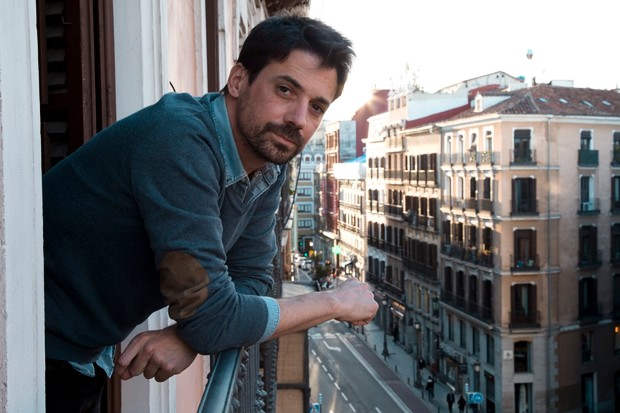Manuel Muñoz Rivas • Director
“It’s been really productive to work with friends who are also filmmakers”
- BERLIN 2017: Cineuropa talks to Spanish director Manuel Muñoz Rivas, who is here at the Berlinale to present his documentary, The Sea Stares at Us from Afar, in the Forum section

The Sea Stares at Us from Afar [+see also:
film review
trailer
interview: Manuel Muñoz Rivas
film profile] is the directorial debut of erstwhile editor and screenwriter, Seville-born Manuel Muñoz Rivas. The documentary, filmed on the Huelva coast, will be screened in the Forum section of the 2017 Berlinale.
Cineuropa: Have you been to the Berlin International Film Festival before?
Manuel Muñoz Rivas: Yes, a few years ago I took part in Berlinale Talents with some of my classmates from the International Film & TV School in San Antonio de los Baños, Cuba, where I studied editing.
How did your first film, The Sea Stares at Us from Afar, come to be a co-production with the Netherlands?
We had made contact previously, at film festivals in Spain, but having the support of the MEDIA programme swayed them to commit to working with me, because it was a guarantee that the film would get made. They took charge of the image and sound post-production.
What enticed you to make the leap from editing to directing? You’ve previously worked with Mauro Herce and Eloy Enciso, amongst others.
I had shot a number of short films and worked with Mauro and Eloy, who are friends of mine; it was a really productive collaboration. Because it’s so difficult to raise funding, you start planting the seeds a long time in advance: I wrote the first dossier for The Sea... six years ago, while I was working as an editor on other projects. When my film finally started to take shape, I was working on Dead Slow Ahead [+see also:
film review
trailer
interview: Mauro Herce
film profile], with Mauro, and we talked about how we could juggle both shoots. In the end, he did the photography for my film and I did the editing for his.
What made you decide to film in Doñana National Park?
My family and I spend the summer in the village you see at the end of The Sea..., Matalascañas. It’s a seaside resort that’s like a graveyard in winter and packed with tourists in summer. There’s a line of sticks in the sand to mark the boundary with Doñana, and at that point the resort ends and the pristine beach begins. That’s where the guys we filmed live. Walking across the dunes, I was struck by these cabins and I went over to talk to the people who live in them. They really interested me in a visual sense, because these houses almost merge into the dunes, like caves. I got to know them; they’re very wary and reserved, because the local authority wants to drive them out of there, so it took me some time to befriend them and make them feel comfortable in front of the camera.
To get so close up, you would presumably have had to use a very small crew...
Yes, most of the time there were just three of us: Mauro Herce, a sound designer, and myself. Sometimes we also had someone there to take care of all the logistic things — a link to the outside world, where we could get batteries and hard disks.
Did you hold a casting session, or does everyone who lives on the beach appear in the film?
The people you see in the film are the ones who are there. They all seem extraordinary to me, because of the way they relate to the world. It made me want to look at them more closely and spend time with them. They have nothing, but they are the masters of their own time and they remind you of that constantly. We did pick out the girl, because we wanted to add a feminine note in a very masculine world. These men don’t have any partners or children; they’re there as a strange kind of voluntary exile. It’s not romantic and it’s not about being close to nature — It’s an inability to live in society. They’re an odd bunch.
(Translated from Spanish)
Did you enjoy reading this article? Please subscribe to our newsletter to receive more stories like this directly in your inbox.















